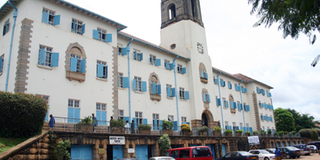Makerere rises in world ranking

Makerere University is celebrating its 90th anniversary this year . Photo by Isaac Kasamani
What you need to know:
Ascent. The university climbed up four places from 1,777 to 1,173 in the world.
Ugandan universities have continued a steady climb up the scale of world universities, latest rankings reveal. The ranking by Webometrics indicates that Makerere University, the biggest and oldest public university, which is celebrating its 90th anniversary this year, climbed up four places from 1,777 to 1,173 in the world.
Makerere also remains the best ranked in the Sub Saharan Africa region despite slipping two places from 9th to 11th on the continent. Also among the top universities are two other public universities; Busitema University and Mbarara University of Science and technology. Also among the top 100 universities in Africa is Anglican church founded Uganda Christian University (UCU) Mukono, Mountains of the Moon University based in Fort Portal and St. Lawrence University
Methodology
The Webometrics rankings are based on the visibility of a university on the internet, the volume and quality of its research publications, and the general impact of the information published on the university’s web pages.
However, the rankings are not based on research, teaching, number of citations, ability to create internally generated funds as well as the international outlook measured by the proportion of international staff and students at institutions in the field.
It also ignores an indicator that examines the proportion of research papers each institution publishes with at least one international co-author.
The above are the criteria’s that are used by the Times Higher Education (THE), Princeton University and Forbes University rankings.
Dr. Vincent Ssembatya, the quality assurance director at Makerere University, said the rise in the rankings is a result of a steady trend of free access of information at the institution.
He, however, noted that the other methods of university rankings are not inclusive and are “very rigorous.” “The Times Higher Education are not inclusive and that is why few African universities are in the top 500. It mainly considers universities in the second bloc and its process is very rigorous and takes a lot of time through exchange of emails,” Dr Ssembatya said in an interview.



